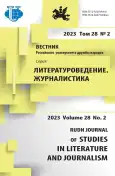The source of tragedy: love problems and the concept of eros in the story of L.D. Zinovieva-Annibal's “Thirty-Three Freaks”
- Авторлар: Wang L.1, Mikhailova M.V.1
-
Мекемелер:
- Lomonosov Moscow State University
- Шығарылым: Том 28, № 2 (2023)
- Беттер: 210-218
- Бөлім: LITERARY CRITICISM
- URL: https://journal-vniispk.ru/2312-9220/article/view/318897
- DOI: https://doi.org/10.22363/2312-9220-2023-28-2-210-218
- EDN: https://elibrary.ru/PCIVFN
- ID: 318897
Дәйексөз келтіру
Аннотация
The theme of love is reflected in a variety of ways in all the works of L.D. Zinovieva-Annibal. As one of the most representative works of the writer, the story “The Thirty-Three Freaks” is an important and particularly revealing link in proving the process of change in the creative method and worldview of the author. The aim of the study is to show the complex relationship between love and eros, not only in the story “The Thirty-Three Freaks”, but also in the real married life of Vyacheslav Ivanov and L.D. Zinovieva-Annibal. The writer's artistic embodiment of the ideas of her husband, the symbolist poet V. Ivanov, on the creation of a new religion, where Eros is “entrenched” and becomes a bearer of “solidarity”, is traced. V. Ivanov's utopian ideal project of organizing a new social form, although it ultimately failed, originally meant the intention to overcome individualism among the initiates, among the participants of the love action, which proves the influence of V. Solovyov's philosophy on the symbolists and, in particular, on the circle of visitors of “The Tower”. The study uses biographical, intertextual, and comparative-historical methods. The conclusion is made that in the ideal form of society, in which there is no place for individualism and egoism, the concept of inseparability of spirit and body should have prevailed. However, analysis of the novel “The Thirty-Three Freaks” shows that the heroine had not overcome individualism, that the path to comprehending of eros was theoretically declared, but was not realized in practice. Hence the tragic sound of the work and its disastrous finale.
Негізгі сөздер
Авторлар туралы
Liuyang Wang
Lomonosov Moscow State University
Хат алмасуға жауапты Автор.
Email: w.liuyang@mail.ru
ORCID iD: 0000-0003-4191-1700
PhD student, Department of the History of Contemporary Russian Literature and Modern Literary Process, Department of Philology
1 Leninskiye Gory, Moscow, 119991, Russian FederationMaria Mikhailova
Lomonosov Moscow State University
Email: mary1701@mail.ru
ORCID iD: 0000-0001-8193-6588
Academician of The Russian Academy of Natural Sciences, D.Sc. (Philology), Professor, Professor of the Department of the History of Contemporary Russian Literature and Modern Literary Process, Department of Philology
1 Leninskiye Gory, Moscow, 119991, Russian FederationӘдебиет тізімі
- Aleshina, S.V. (1999). L.D. Zinovieva-Annibal. Creative evolution (Doctoral dissertation). Lipetsk. (In Russ.)
- Berdyaev, N.A. (1971). The Russian idea. Paris. (In Russ.)
- Bogomolov, N.A. (1991). We are two trees struck by the lightning. Eroticism in Russian Poetry from the Symbolists to the Oberiuts. Literary Review, (11), 56-65. (In Russ.)
- Brylina, I.V. (2014). Philosophy of Russian Eros as a socio-cultural phenomenon. Eurasianism and the World, (1), 65-81. (In Russ.)
- Defarges F. (2018). Lydia Zinovieva-Annibal: Being a woman and a writer in the Russian Silver Age. Revue Russe, (51), 29-40. http://doi.org/10.3406/russe.2018.2857
- Ivanov, V.I. (1971). Collected works (vol. 1). Bruxelles. (In Russ.)
- Ivanov, V.I. (1979). Collected works (vol. 3). Bruxelles. (In Russ.)
- Ivanov, V.I. (1999). Preface to the posthumous edition of Thirty-Three Abominations. In L.D. Zinovieva-Annibal, Thirty-Three Abominations (pp. 439-443). Moscow: Agraf Publ. (In Russ.)
- Kozlova, L.N. (2017). What Thirty-Three Abominations by Zinovieva-Annibal is about? Psychological aspect of the history of contacts of the Voloshin family and the family of Vyacheslav Ivanov in St. Petersburg. Cimmerian Topos: Myths and Reality: Collection of Scientific Articles of the International Philosophical and Cultural Conference, Koktebel, 2013-2016 (pp. 51-59). Koktebel: Antikva Publ. (In Russ.)
- Mikhaylova, M.V. (1998). Faces and masks of Russian women's culture of the Silver Age. Gender Studies: Feminist Methodology in Social Sciences (pp. 117-132). Kharkov. (In Russ.)
- Mikhaylova, M.V. (1999). Passion for Lydia. Thirty-Three Abominations: Novel, Stories, Essays, Plays (pp. 5-24). Moscow: Agraf Publ. (In Russ.)
- Sabashnikova, M.V. (1993). Green snake. Story of one life. Moscow: Enigma Publ. (In Russ.)
- Soloviev, V.S. (1991). The meaning of love. Russian Eros, or the Philosophy of Love in Russia: Compendium. Moscow: Progress Publ. (In Russ.)
- Sukovataya, V.A. (1999). Thirty-three abominations by Lydia Zinovieva-Annibal, or the Erotic other in women's narrative. Gender Studies, (2) (In Russ.) http://doi.org/10.13140/RG.2.2.13670.11845
- Tsimborska-Leboda, M. (1997). Eros in the works by Vyacheslav Ivanov. The Culture of the Russian Diaspora: Self-Reflection and Self-Identification (pp. 54-68). Tartu: Tartu University Press. (In Russ.)
- Voloshin, M.A. (1988). Yar. Poem by Sergei Gorodetsky. Faces of Creation. Leningrad: Nauka Publ. (In Russ.)
- Zinovieva-Annibal, L.D. (1999). Thirty-three abominations: Novel, stories, essays, and plays. Moscow: Agraf Publ. (In Russ.)
Қосымша файлдар









